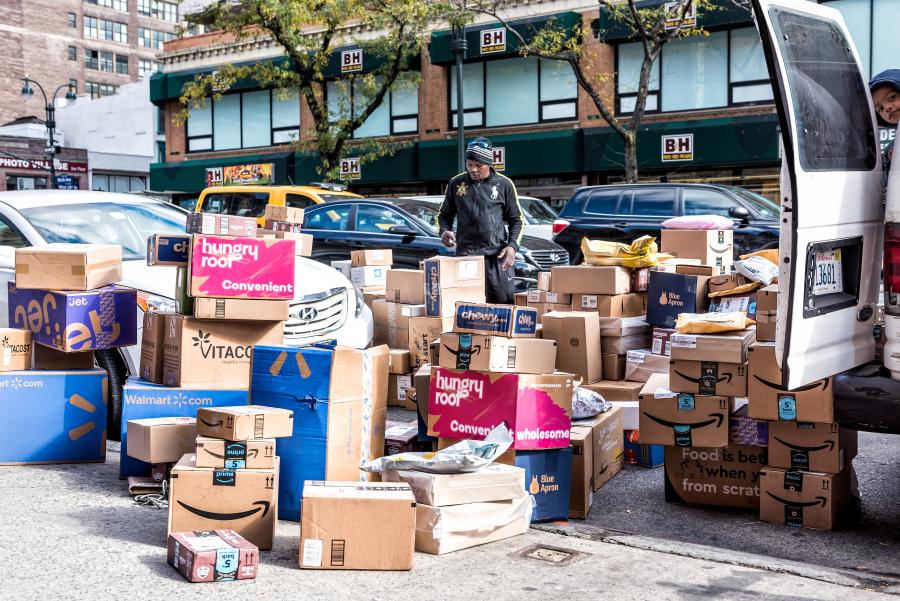
OCTOBER 8, 2018 — The Urban Freight Lab at the Supply Chain Transportation and Logistics (SCTL) Center, University of Washington, has received a $1.5 million award from the U.S. Department of Energy for a project on Technology Integration to Gain Commercial Efficiency for the Urban Goods Delivery System, Meet Future Demand for City Passenger and Delivery Load/Unload Spaces, and Reduce Energy Consumption.
Researchers on the project will pilot test integrating technologies to reduce the time truck drivers spend circling the block to find a downtown parking spot, let transit commuters conveniently and securely pick up parcels and food ordered online near their bus or train stop, and make commercial vehicle load zones much more productive in dense urban areas.
The grant will enable the Urban Freight Lab to conduct on-street pilot tests of three innovative solutions in Seattle’s Center City:
- By placing occupancy sensors in load/unload spaces in an eight-block test location in Center City and analyzing the data in real time, the project will have very large data streams to feed a prototype app to inform truck dispatchers and drivers if a specific load/unload space near their delivery destination is open or occupied, and if it’s occupied—predict when it will become available. The information will be sent to users on a web-based and/or mobile platform to inform their real-time parking decisions. The Lab will also place sensors in a control site in Center City, so they may compare what happens when users have advance knowledge of parking occupancy to the current situation. This pilot is built on previous work done for the Seattle Department of Transportation by the Urban Freight Lab in 2017-18, in which the Lab GIS-mapped every alley and privately-owned loading bay and dock in Center City. When combined with the City’s existing curb parking space data layer, the private load/unload and alley geospatial layers form the City’s complete load/unload network.
- Create parcel delivery density and security by placing common carrier locker systems near commercial load/unload zones and transit stops in the pilot test area. By definition, unlike branded lockers that are restricted to just one company (e.g. Amazon, UPS, or FedEx), common carrier lockers may be used by all retail and delivery firms, and anyone could sign up to receive their online purchases at the locker. The Urban Freight Lab’s prior research documented that common carrier lockers can cut the time it takes for a parcel delivery person to do their work in skyscrapers by up to 78%. When delivery people spend less time going floor-to-floor and door-to-door to individual tenants in urban towers, they do not need to park as long. The resulting increased productivity will add capacity in cities’ load/unload space networks without building more infrastructure. The Lab plans to test parcel and food deliveries to common carrier lockers during this project, and invite a limited number of the public to participate in the test.
- Unleash unused privately-owned truck load/unload space to add more parking capacity in the final year of the project, by inviting building managers in the test area to offer off-peak load/unload space to outside users.
The project’s partners are the City of Seattle Department of Transportation, the Bellevue Department of Transportation, CBRE Seattle, King County Metro Transit, Pacific Northwest National Laboratory, Sound Transit, Western Washington Clean Cities, and members of the Urban Freight Lab.
READ MORE:
About the Urban Freight Lab (UFL): An innovative public-private partnership housed at the Supply Chain Transportation & Logistics Center at the University of Washington, the Urban Freight Lab is a structured workgroup that brings together private industry with City transportation officials to design and test solutions around urban freight management.
In the Media:
- University of Washington Civil & Environmental Engineering News: SCTL awarded $1.5 million to improve goods delivery system
- Eno Transportation Weekly: Can Common Carrier Locker Systems Solve Urban Freight Challenges?
- Tri-City Herald: Parking is a pain for delivery drivers. Tri-Cities lab is working on an app for that